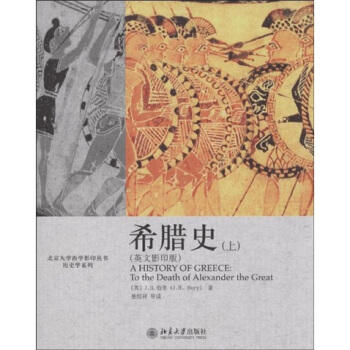

具体描述
编辑推荐
1920年我上学的时候就使用了这本书,它注重政治史和军事史,在大量使用可靠的文献和考古材料的同时,对史料价值偏低的神话传说也有谨慎的引用。毫无疑问,它具有最高的品质。——N.G.L.Hammond,布里斯托大学希腊史教授
伯里教授的《希腊史》是大学教材与专业学者撰写的历史普及读物两方面尝试的完美结合。
——Ronald Burrows,伦敦大学国王学院前院长
内容简介
《希腊史(英文影印版)(上下)》以平实流畅的语言、均衡合理的框架和扎实全面的史料,自1900年初版以来,成为西方世界最受欢迎的希腊史通史教材和入门读物,并畅销不衰,至今仍是欧美各大学历史课堂上的必读经典。《希腊史(英文影印版)(上下)》以伯里生前亲自修订过的1913年版为底本影印。首都师范大学历史系教授、希腊史专家晏绍祥为《希腊史(英文影印版)(上下)》撰写导读,并补充提供了数十年来新的研究成果和重要著作,方便读者在《希腊史(英文影印版)(上下)》的基础上,对希腊史做进一步的了解。作者简介
J.B.伯里(John Bagnell Bury,1861—1927),英国著名历史学家、古典学家和文献学家,1902年获任剑桥大学钦定近代史讲座教授。曾涉足多个领域的研究,包括古代希腊、古代罗马、19世纪教皇史、西方思想史等,而尤以晚期罗马帝国史和拜占庭史见长。其代表作有《晚期罗马帝国:从阿卡狄乌斯到爱里尼》(1889年)、《东罗马帝国史:从爱里尼垮台到巴塞尔一世登基》(1912年)、《希腊历史学家》(1909年)、《思想自由史》(1914年)、《进步的观念》(1920年)、《晚期罗马帝国史:从提奥多西一世之死到查士丁尼之死》(1923年)、《19世纪教皇史,1864—1878》(1930年)等,并曾为吉本《罗马帝国衰亡史》做校勘和注释。内页插图
目录
导读作者简介
1913年版序言
第一版序言
引言希腊与爱琴海
第一章 希腊的开端与英雄时代
希腊人的起源
爱琴文明克里特
迈锡尼文明(公元前1600一前1100年)
阿该亚人与特洛伊战争
荷马史诗
政治与社会组织
多里安人的征服
希腊人向东爱琴海的扩张
希腊君主制的衰落与共和制的兴起
腓尼基人与希腊人的往来
希腊人对早期希腊史的重建
第二章 希腊的扩张
希腊殖民的起因与特征
黑海、马尔马拉海和北爱琴海海岸的殖民地
西部地中海的殖民地
贸易与海上冒险的兴起
吕底亚对希腊的影响
埃及的开放
昔兰尼
第三章 斯巴达的崛起
斯巴达及其政体
斯巴达征服美塞尼亚
斯巴达的内部发展及其制度
克里特的政体
阿尔戈斯的霸权与衰落奥林匹亚赛会
民主运动立法者与僭主
中希腊的僭主政治
神圣战争泛希腊赛会
第四章 阿提卡的统一与雅典民主制的奠基
阿提卡的统一
雅典共同体的建立
公元前7世纪的寡头统治
梭伦立法与民主制的奠基
第五章 雅典的崛起
对萨拉米斯和尼萨亚的征服
庇西特拉图治下的雅典
斯巴达的崛起以及伯罗奔尼撒同盟
庇西特拉图家族的倒台与斯巴达的干预
国王克列欧美涅斯与斯巴达的第二次干预
克里斯梯尼改革
民主制的第一次胜利
第六章 波斯向爱琴海的推进
波斯的兴起与吕底亚王国的灭亡
波斯对亚洲希腊人的征服
波斯征服埃及萨摩斯的波利克拉底斯
大流士治下的爱奥尼亚
大流士远征欧洲:征服色雷斯
爱奥尼亚人反波斯的起义
大流士第二次与第三次的欧洲远征:马拉松之役
雅典与厄基那的争端
雅典民主制的发展
即将成为海上强国的雅典
第七章 希腊的危机波斯与迦太基入侵
薛西斯的备战与进军
希腊的备战
温泉关战役与阿提密西安战役
萨拉米斯之战
萨拉米斯战役的影响
为另一次战役做准备
普拉提亚之战
密卡尔之战与夺得塞斯都斯
叙拉古的僭主格伦
迦太基入侵西西里希米拉战役
希伦和塞隆治下的叙拉古与阿克拉加斯
(公元前)6世纪的宗教运动
奥尔弗斯教的传播
爱奥尼亚的理性
第八章 雅典帝国的建立
斯巴达的地位和帕萨尼亚斯的经历
提洛同盟
雅典和比雷埃夫斯的设防
地米斯托克利的放逐和死亡
提洛同盟变成雅典帝国
奇蒙的政策与放逐
第九章 伯里克利领导下的雅典帝国
雅典民主制的完善
雅典人与伯罗奔尼撒人的战争
与波斯人的和平协议
雅典的挫折三十年和约
伯里克利的帝国主义政策
神庙的重建
比雷埃夫斯雅典贸易的发展
雅典人在意大利的野心
雅典对色雷斯和黑海的政策
萨摩斯暴动
高等教育智者
第十章 雅典人与伯罗奔尼撒人的战争(公元前43l一前421年)
战争的序幕
战争纵览
底比斯人攻打普拉提亚
瘟疫
对普拉提亚的围攻和占领
米提林叛乱
西部希腊人的冲突
德摩斯梯尼在西部的作战
……
第十一章 雅典帝国的衰亡
第十二章 斯巴达霸权及其对波斯的战争
第十三章 雅典的复兴及其第二次结盟
第十四章 忒拜霸权
第十五章 叙拉古帝国及其与迦太基的争夺
第十六章 马其顿的崛起
第十七章 征服波斯
第十八章 征服远东
年表
注释和参考文献
索引
进一步阅读书目
精彩书摘
In Attica there are many relics. On the Athenian Acropolis thereare a few stones supposed to belong to a palace of great antiquity,but we can look with more certainty on some of the ancient foun-dations of the fortress wall. This wall was called Pelargic or Pelas-gic by the Athenians; and it seems likely that the word preservesthe name of the ancient inhabitants of the place, the Pelasgoi31But the Pelasgians of Athens were not the only people of the Athe-nian plain. Towards the northern end of this plain, a vaulted tombseems to record ancient princes of Acharnae. The lords of Thoricushad tombs of the same fashion; and at Eleusis there is similar evi-dence. In many other places in Attica graves of this period havebeen found; at Prasiae a number of remarkable rock-tombs re-sembling those in the lower town of Mycenae. In Boeotia there are some striking memorials. Remains of a pal-ace, with some traces of wall paintings, have been found on Cad-meia, the citadel of historic Thebes. On the western shores of thegreat Copaic marsh a people dwelled, whose wealth was proverb-ial; and their city Orchomenus shared with Mycenae the attributeof "golden" in the Homeric poems. Paintings on the walls of theirpalace represented scenes from the sports of the bull-ring, and pil-lar shrines, which must have been executed by artists of the sameschool as those who wrought at Cnossus. One of their kings built agreat sepulchral vault under the hill of the citadel, and later gen-erations took it for a treasury. It approached, though it did notquite attain to, the size of the Treasure-house of Atreus itself; andit had a second chamber covered by a stone ceiling which wasadorned with a curious design in low relief, an arrangement ofmeandering spirals and fan-shaped leaves bordered by rosettes,producing the effect of a carpet. The same design which deckedthe burying-place of Orchomenus in stone was used by the paintersof some lord of Tiryns to adorn the walls of his palace; and one istempted to see both in the ceiling and in the sepulchre the work ofcraftsmen from Crete.前言/序言
THE excavations of Sir Arthur Evans at Cnossus began in theyear in which the first edition of this History of Greece appeared(I9oo). His amazing discoveries there, followed and supple-mented by the work of other explorers on many other prehistoricsites in Crete, have transformed our knowledge of the Aegeancivilisation of the second millennium, and placed in a new focusthe problems of early Greece. In consequence of these dis-coveries, and of other researchs (among which I may mentionespecially Professor Ridgeways Early Age of Greece and Mr.Leafs Troy), it has been necessary to rewrite the greater part ofChapter I. An account of Cretan civilisation is included; theview that the pre-Achaean inhabitants of Greece were not Greeks,which it seems to me no longer possible to maintain, is aban-doned; and the Trojan War is recognised to be an historicalevent.Outside Chapter I, a few minor changes have been made. Ineed only mention that the accounts of the battles of Salamisand Plataea have been-partly rewritten.
用户评价
这套影印本的装帧和纸张,虽然在便携性上有所欠缺,但作为案头工具书却是绝佳的选择。我习惯将它平摊在书桌上,旁边放着笔记本和笔,随时准备做标记和记录。由于是英文原版,它提供了一个直接接触一手研究材料的机会,这对于任何想要进行更深层次研究的人来说都是宝贵的。它避免了翻译过程中可能出现的理解偏差或风格损耗。每次翻阅,那种厚重的纸张和墨香混合在一起的气味,都像是一种无声的仪式感,提醒着自己正在与一位伟大的历史学家进行跨越时空的对话。它不追求时髦的包装或轻快的节奏,它追求的是知识的准确传递和历史的忠实再现。这套书,更像是一个可以信赖的、沉默的向导,它指引方向,但具体的探索之路,需要读者自己一步一个脚印地走下去。
评分书中所呈现出的那种冷静、克制的叙事口吻,是西方古典史学家的标志性风格。作者似乎对任何带有强烈主观色彩的评价都持保留态度,他更倾向于呈现“事实”,并引导读者自己去建构理解。比如,在描述雅典民主的兴衰时,他并没有简单地将其描绘成一个光荣的顶点或必然的衰落,而是细致地剖析了其内部的张力、精英阶层的博弈以及民众情绪的波动。这种多维度的视角,使得我们看待历史人物时,不再是脸谱化的英雄或恶人,而是生活在特定历史框架下的复杂个体。我尤其欣赏作者在处理不同城邦之间的关系时,那种近乎于地缘政治学的分析框架,将军事、贸易、文化交流等因素编织在一起,形成了一个相互作用的复杂系统。这种宏观的把握能力,展现了作者深厚的历史洞察力,让人在合卷之后,仍能感受到那个时代社会运作的复杂性和精妙性。
评分这本书的封面设计,说实话,初看之下有些朴素,是那种典型的学术书籍的风格,厚重的纸张和略带泛黄的内页,一下子就把人拉回了那个遥远的年代。我拿到手的时候,首先感受到的是它沉甸甸的分量,这重量似乎不仅仅是物理上的,更像是一种历史的厚度。翻开扉页,那熟悉的英文印刷体,每一个字母都像是带着历史的尘埃,虽然是影印版,细节处理得还算不错,但偶尔还是能看到一些年代留下的痕迹,这反而增添了一种别样的真实感,仿佛我手里拿的不是一本现代再版的书,而是直接从图书馆的旧书架上取下的原版珍藏。我特别留意了一下目录,那清晰的章节划分,预示着内容的严谨和深度,不是那种走马观花式的历史普及读物,而是准备深入挖掘某个特定时期的社会结构、政治演变乃至哲学思想的精髓。这种扎实的结构,对于一个渴望系统学习的读者来说,无疑是极大的吸引力,让人忍不住想立刻沉浸其中,去触摸那些古老文明的脉搏。
评分对于非专业人士来说,这套书的学术深度可能会构成一定的门槛。特别是涉及到古希腊的法律体系、复杂的军事编制或者哲学思潮的早期演变时,如果没有一定的背景知识作为支撑,初读时可能会感到吃力。我记得有几章关于柏拉图学园思想流变的部分,我不得不反复阅读,甚至需要借助一些导读材料才能理清其中的逻辑链条。但这恰恰体现了这本书的价值所在——它不媚俗,它提供的是高质量的知识原件。它更像是一份严谨的学术地图,而不是一份旅游指南。如果你只是想了解一些诸如“斯巴达人如何训练”、“特洛伊战争的概况”这类简单信息,这本书可能显得过于繁琐和深入。但如果你想真正理解为什么古希腊文明会产生如此深远的影响,并想探究其思想根源,那么这种“门槛”反而成为了一种筛选机制,保证了阅读者的专注度和投入度。
评分阅读体验上,这套书的排版确实考验眼力,影印的特点使得字体的清晰度不如现代激光打印,有些地方可能需要凑近了才能辨认。不过,一旦你适应了这种略显古旧的阅读节奏,反而能从中体会到一种独特的韵味。我发现作者在论述某个特定事件时,习惯于引用大量的原始文献片段,这些英文的引文,虽然增加了理解的难度,但同时也极大地增强了论证的力量和说服力。这就像是作者拉着你,亲自去触摸历史的源头,而不是仅仅听他转述。我常常会暂停下来,去查阅那些陌生的词汇和历史背景,这个过程本身就是一种学习的深化。它强迫你慢下来,去咀嚼那些字里行间蕴含的复杂信息,而不是像现在很多快餐式阅读那样,一扫而过,不留痕迹。这种需要主动思考和探究的阅读方式,让我感觉自己的知识结构正在被一点点地夯实,非常过瘾。
评分比雷埃夫斯雅典贸易的发展
评分多读书,可以让你有许多写作灵感。可以让你写文章的方法更恰当,在写作的时候,往往可以运用一些书中的好词好句和生活哲理,使文章更富有文采、美感。
评分庇西特拉图治下的雅典
评分影印的质量差劲,印油都有浸染情况,单词的字母一个个长毛了一样
评分研究希腊式必备,经典
评分西部希腊人的冲突
评分斯巴达的地位和帕萨尼亚斯的经历
评分民主制的第一次胜利
评分索引
相关图书
本站所有内容均为互联网搜索引擎提供的公开搜索信息,本站不存储任何数据与内容,任何内容与数据均与本站无关,如有需要请联系相关搜索引擎包括但不限于百度,google,bing,sogou 等,本站所有链接都为正版商品购买链接。
© 2026 windowsfront.com All Rights Reserved. 静流书站 版权所有

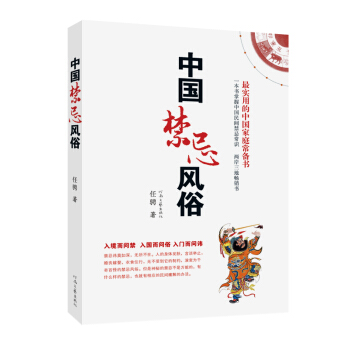
![世界古文明书系 千佛长廊的高棉、吴哥窟 [The Khmers] pdf epub mobi 电子书 下载](https://pic.windowsfront.com/11340187/5448b0a4N87d131a4.jpg)

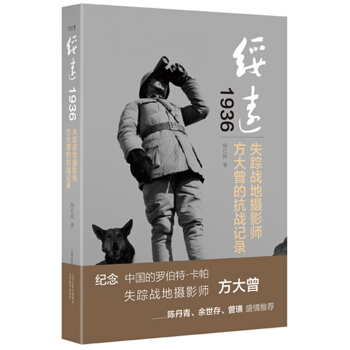
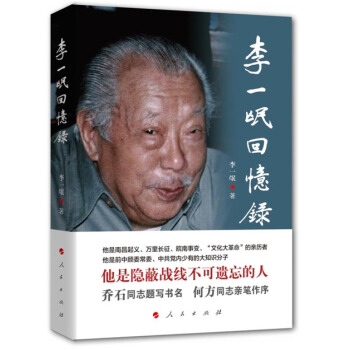
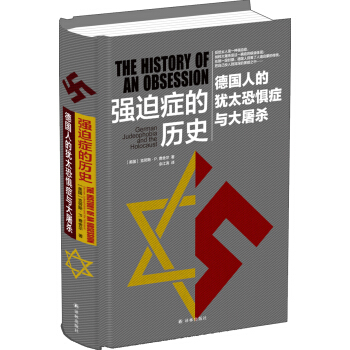

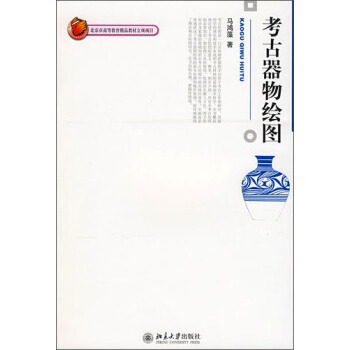
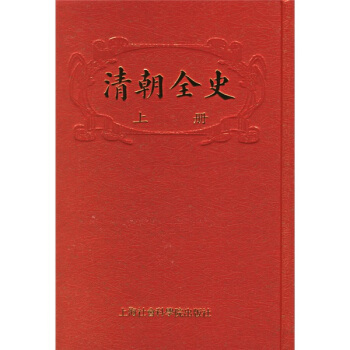
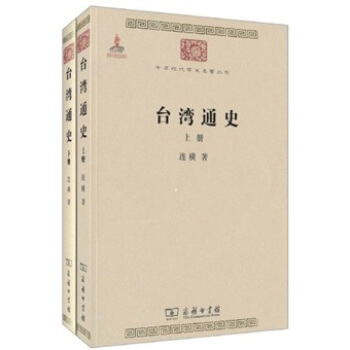


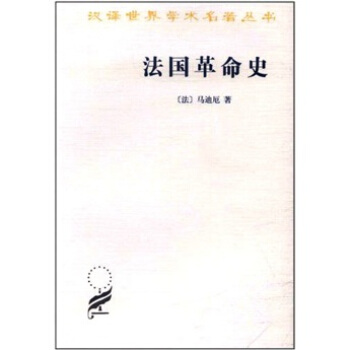
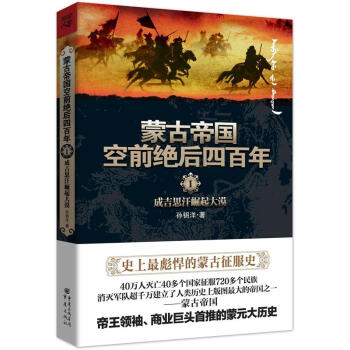
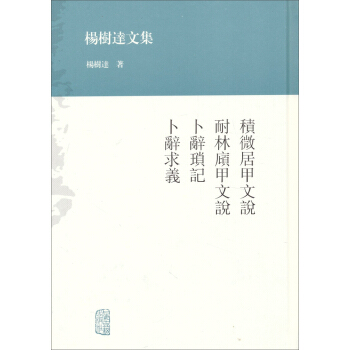
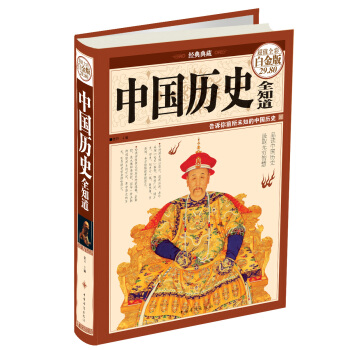
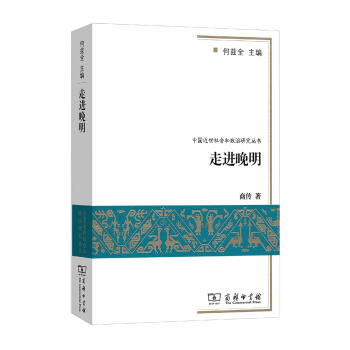

![货币野史 [Money: The Unauthorised Biography] pdf epub mobi 电子书 下载](https://pic.windowsfront.com/11609389/54b71944Na45adefd.jpg)
